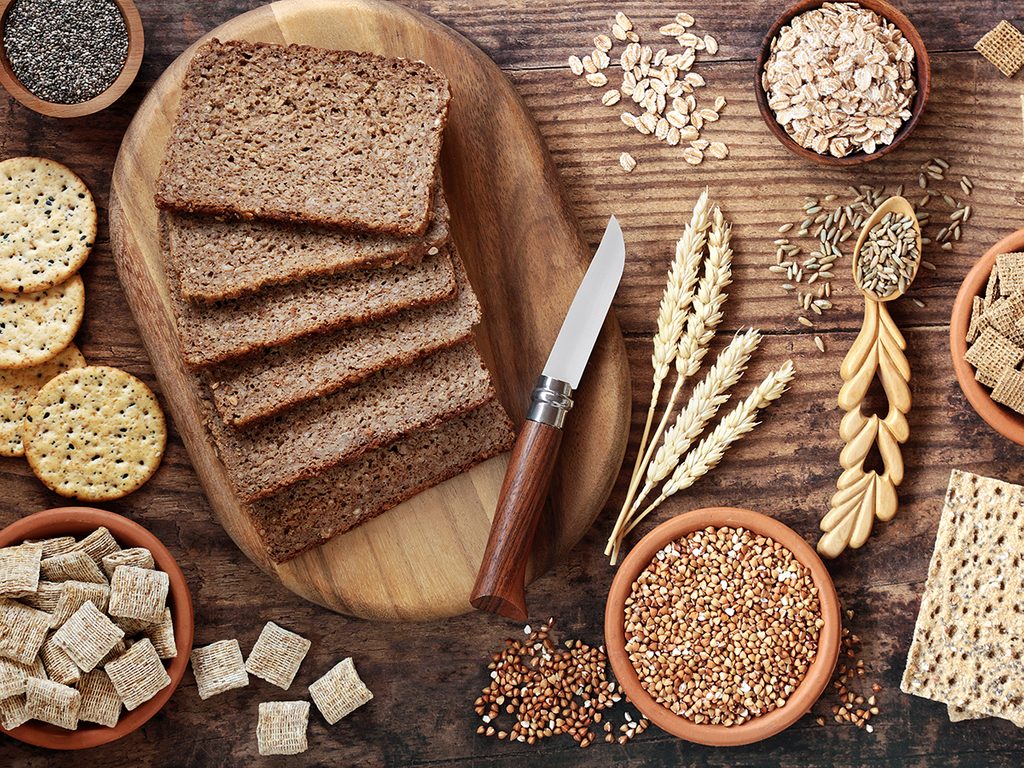If You Eat This Food, You Could Reduce Your Risk of Colorectal Cancer by 17 Percent

If you need an excuse to chow down on carbs, you're in luck. A report from global cancer researchers suggests you can lower your risk of colorectal cancer by eating more whole grains.
According to the Canadian Cancer Society, around 26,900 Canadians will be diagnosed with colorectal cancer in 2020. What’s particularly shocking is that colon and rectal cancers are striking younger adults more often than in the past. For example, millennials born in 1990 have more than twice the risk of developing colorectal cancer than their peers born in 1950. “Colorectal cancer is one of the most common cancers,” said Edward L. Giovanucci, MD, ScD, in a press release from the American Institute for Cancer Research (AICR).
A 2017 report by the AICR and the World Cancer Research Fund (WCRF) yielded some good news: “There is a lot people can do to dramatically lower their risk.” The findings are “robust and clear,” Dr. Giovanucci says: “Diet and lifestyle have a major role in colorectal cancer.”
Specifically, the report suggests that eating whole grains daily may reduce the risk of colorectal cancer by about 17 percent. This adds to previous scientific evidence that fibre-containing foods may decrease the risk of this particular cancer. In the report, scientists conducted a comprehensive analysis of 99 existing scientific studies, including data on about 29 million people. Of those, over a quarter of a million had been diagnosed with colorectal cancer.
What exactly qualifies as whole grain?
Whole grains include both the grain’s bran and germ, says colorectal cancer expert Darrell Gray, MD, of The Ohio State University Comprehensive Cancer Center, who was not directly involved in the study.
“The bran is the multi-layered outer skin of the edible kernel. It contains important antioxidants, B vitamins, and fibre. The germ is the part of the grain that has the potential to sprout into a new plant. It contains many B vitamins, some protein, minerals, and healthy fats. “The whole grain is a rich source of phytochemicals and antioxidants that have anticancer properties,” Dr. Gray explains.
He adds that “whole grains are thought to exert beneficial effects in colorectal cancer prevention by lowering fasting insulin levels.”
How much do you have to eat to see benefits?
According to the study, three servings of whole grains per day (a total of 90 grams) was associated with the 17 percent decrease in cancer risk. A single serving of whole grains is equal to a 1/2 cup of cooked brown rice, oatmeal, or other whole grain, or a cup of whole-grain cereal.
(Related: The benefits of eating oatmeal for breakfast.)
Dr. Gray suggests bran-flake cereal, but there are many other options. For foods that contain not only whole grain but also other ingredients (for example, whole grain crackers, granola bars, bread, and muffins), you’ll have to eat a larger amount to get the optimal dose of whole grain.
The report notes that some lifestyle habits are associated with a higher risk of colorectal cancer:
- Eating lots of red meat such as beef or pork (more than 500 grams, or a little over 1 pound, cooked, per week)
- Eating hot dogs, bacon, and other processed meats on a regular basis
- Being overweight or obese
- Consuming two or more daily alcoholic drinks (30 grams of alcohol) daily, such as wine or beer
- Smoking
Other ways to lower your risk of colorectal cancer
In addition, the report states that people who are more physically active (at least 30 minutes of physical activity per day) have a lower risk of colon (but not rectal) cancer compared to those who do very little physical activity. It also found limited evidence that eating fish and foods containing vitamin C (such as oranges, strawberries, and spinach) is associated with lower the risk of colorectal cancer.
(Related: Here’s how to get active when you hate exercising.)
“All of this points to the power of a plant-based diet,” says Alice Bender, RDN, director of Nutrition Programs at AICR. “Replacing some of your refined grains with whole grains and eating mostly plant foods, such as fruits, vegetables, and beans, will give you a diet packed with cancer-protective compounds and help you manage your weight, which is so important to lowering risk.”
“When it comes to cancer there are no guarantees,” she adds, “but it’s clear now that there are choices you can make and steps you can take to lower your risk of colorectal and other cancers.”
Next: One woman shares what it’s like to live with Inflammatory Bowel Disease.




